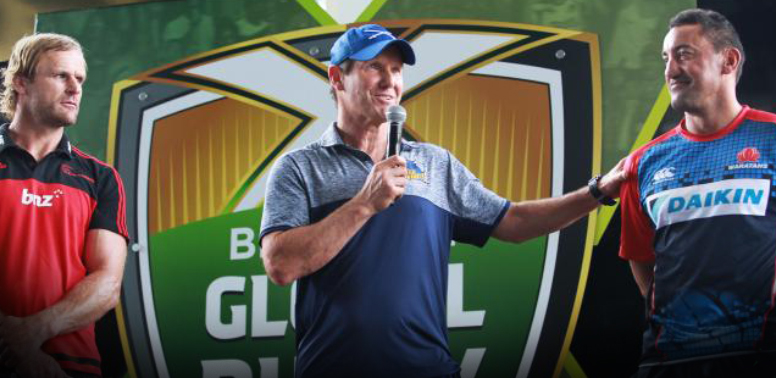"Be yourself skilfully": Notes from Brisbane Tens coaching summit
/In the build up towards Brisbane Global Tens event, I was fortunate to attend a series of key note presentations from some involved coaches including Robbie Deans and Scott Robertson, as well as featuring current Wallabies national coach Michael Cheika. The discussion was led by Rod Kafer and he echoed recent studies and investigations towards trying to understand what the players of the future are looking for from their coaches. Former Wallaby coach, Robbie Deans started proceedings and addressed "why" being the most important question you can both ask and answer. While he stated that technical and tactical skills can be easily found with access to information nowadays, understanding and caring for player's needs shall massively assist your quest to find your side's point of difference against the rest of the competition, echoing the importance of personal strivings research I have completed with current crop of Australian Rugby players. Deans encouraged the coaches present to grab all chances for informal communications to connect with players, echoing players must know you care about them:
"Players don't care what you know until they know you care"
Discussing coaching styles, Deans referenced ideas including encouraging effort, offering players choices or ability to make decisions and preparing your group to encourage them to take ownership and responsibility, encouraging ideas such as peer modelling and 360 degree feedback. He echoed another strong statement from the day of ignoring the focus on shape and structure, encouraging more and different opportunities for decision making at training, reminding coaches of the importance of clear communication and terminology as the areas and terms you empathise shall be what the players follow and adhere to. This point was echoed further later by Michael Cheika by him believing that "players become more like you the more you show belief".
Simon Manix was next to address the group; current head coach of Pau in the Top 14 having previously worked as backs coach for Munster and Racing Metro. Mannix played one test for the All Blacks versus France in 1994, an area he touched on immediately. His sole cap tormented him with a feeling of failure and shaped his coaching philosophy going forward. He immediately looked to leave NZ, embracing the culturally challenging yet rewarding atmosphere of French sides, having been involved in the structurally rigid and historically steeped atmosphere of Munster. He underlined the importance of challenging players and stressed his ideals for his players are to play with enjoyment and excitement for prolonged motivation and passion, areas he finds as extremely important.
2107 Super winning coach. Scott Robertson was next to address the group regarding culture and how he assisted building this within Canterbury Crusaders' organisation; he admitted this was both challenging and effortless, having 16 Crusaders' centurions, plenty of All Blacks within the squad yet working out how to show his personality in group also . He worked with Kiwi anthropologist, Michael Henderson looking at all factors relating to culture; he addressed the group through questioning how sounds, symbols, stories, sequence, smells, stage, space and significance all tie in to how players or groups "buy into" the culture. He empathised the strong, personal relationships he had with playing members and especially his team leaders including Sam Whitelock. He talked how he would assist setting the plan and goals yet really came down to the players to implement and drive improvement. Ideas to review and improvement are always shaped through solution based meetings and positive interactions and conversations, using constructive not destructive language. Honesty was another theme within his philosophy - players identifying their role and "doing the right thing" right through to honest mentoring from other coaches such as Rob Penney.
Closing out the day, Michael Cheika and Mick Byrne (ARU National Skills Coach) addressed the room, offering background to their history and passion towards the game. Cheika admitted he started coaching as "a way to travel"; now, as head coach of the Wallabies, he sees his strengths as being an authentic leader, offering honest feedback and capable of building a strong team atmosphere, including surrounding himself in good coaches to support his generalist outlook to team coaching, having quality people supporting and looking after the finer details. His brashness towards comments of current and departed Wallabies was evident; he believes the current crop of players involved in Australian squads are as strong as ever and is weary of the "excuse culture" for players heading overseas. This was strengthened by Byrne's attitude that Australian Rugby needs to work harder at all aspects of the game. Both coaches talked of their desire to have strong Super sides, backed up with individual hard work and being physically ready to compete but both are excited by the depth of talent coming through. They also thanked all present for the encouragement from the community and the support (and dedication to improve) grassroots rugby.
Cheika summarised one of the overall themes of the day very well (although I paraphrased his point); Winning is a consequence of getting the other things right. All coaches highlighted the importance to stop prescriptive coaching and too much focus on shape and structure and exhibit greater concentration on gaining a better understanding of your current crop of player's skills, capabilities and motivations. All coaches, including the Wallaby representatives, stressed that player belief supersedes confidence, all being built from accountability, persistence, encouraging effort and understanding players needs as opposed to technical and tactical overload. The powerful message stamped down by all: Build the person's motivation and skills through understanding "why..." and you shall make a better player. As I have stressed before, find their passions and help them double down on their strengths; keep looking for problems to fix and all you shall see is problems.


